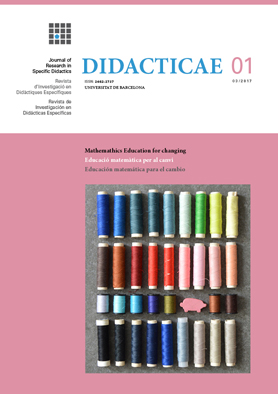Recontextualizaciones y ensamblajes: ABP y matemáticas universitarias
DOI:
https://doi.org/10.1344/did.2017.1.4-25Palabras clave:
aprendizaje basado en problemas, ABP, mediación tecnológica, modelaciónResumen
Un problema común en el aprendizaje de las matemáticas universitarias es la brecha entre el formalismo y la abstracción y el uso de los mismos en un contexto específico como la ingeniería. Las competencias adquiridas a través del aprendizaje basado en problemas (ABP), en el modelo pedagógico de la Universidad de Aalborg en Dinamarca puede mostrar cómo tender un puente para cerrar esta brecha. A través del análisis de los reportes finales de semestre que realizan estudiantes de primer ciclo de ingeniería, donde herramientas matemáticas se recontextualizan y ensamblan en el abordaje de problemas interdisciplinarios complejos, describimos y analizamos las competencias logradas por los estudiantes cuando realizan ese tipo de proyectos. Queremos mostrar cómo la actividad de los estudiantes dentro de este ambiente ofrece posibilidades de aprendizaje que van más allá de la clásica distinción entre el aprendizaje formal y las aplicaciones de las matemáticas.Citas
Abdulwahed, M., Jaworksi, B., y Crawford, A. R. (2012). Innovative approaches to teaching mathematics in higher education: A review and critique. Nordic Studies in Mathematics Education, 17(2), 49-68.
Barrows, H. S. (1986). A taxonomy of problem-based learning methods. Medical Education, 20(6), 481-486.
Beach, K. (1999). Consequential transitions: A sociocultural expedition beyond transfer in education. Review of Research in Education, 24, 101-139.
Bingolbali, E., y Monaghan, J. (2008). Cognition and institutional setting. En A. Watson y P. Winbourne (Eds.), New directions for situated cognition in mathematics education, Vol. 45, 233-259. Springer US.
Dahl, B., y Kolmos, A. (2015). Students’ attitudes towards group based project exams in two en-gineering programmes. Journal of Problem Based Learning in Higher Education, 3(2), 62-79.
Flyvbjerg, B. (2001). Making social science matter: why social inquiry fails and how it can succeed again. Oxford, UK; New York: Cambridge University Press.
Hernández, C., Ravn, O., y Valero, P. (2015). The Aalborg University PO-PBL model from a socio-cultural learning perspective. Journal of Problem Based Learning in Higher Education, 3(2), 16-36.
Knijnik, G. (2012). Differentially positioned language games: ethnomathematics from a philosophical perspective. Educational Studies in Mathematics, 80(1), 87-100.
Kolmos, A. (2008). Problem-based and project-based learning. En O. Skovsmose, P. Valero y O. R.Christensen (Eds.), University science and mathematics education in transition, 261-280.New York: Springer.
Kolmos, A., Fink, F. K., y Krogh, L. (2004). The Aalborg PBL model. Aalborg: Aalborg University Press.
Krogh, L., y Jensen, A. A. (Eds.). (2013). Visions, challenges and strategies: PBL principles and methodologies in a Danish and global perspective. Aalborg: Aalborg University Press.
Latour, B. (1994). On technical mediation. Philosophy, sociology, genealogy. Common Knowledge, 3(2), 29-64.
Lobato, J. (2006). Alternative perspectives on the transfer of learning: History, issues, and challenges for future research. Journal of the Learning Sciences, 15(4), 431-449.
Niss, M. (2002). University mathematics based on problem-oriented student projects: 25 years of experience with the Roskilde Model. En D. Holton, M. Artigue, U. Kirchgräber, J. Hillel, M. Niss y A. Schoenfeld (Eds.), The teaching and learning of mathematics at university level, Vol. 7, 153-165: Springer Netherlands.
Renshaw, E. (1991). Modelling biological populations in space and time. Cambridge; New York: Cambridge University Press.
Roth, W.-M. (2008). The gap between university and the workplace: Examples from graphing in science. En O. Skovsmose, P. Valero y O. R. Christensen (Eds.), University science and mathematics education in transition (p.133-155). New York: Springer.
Schoenfeld, A. H. (1992). Learning to think mathematically: Problem solving, metacognition, and sense making in mathematics. En D. A. Grouws (Ed.), Handbook of research on Mathematics teaching and learning (p. 334-369). New York: Macmillan.
VV.AA. (2005). Fugleinfluenza [Gripe aviaria]. Aalborg: Basisår. Det teknisk-naturvidenskabeligFakultet. Aalborg Universitet.
VV.AA. (2007). Rangordning af søgeresultater [Jerarquía de resultados de búsqueda]. Aalborg: Basisår. Det teknisk-naturvidenskabelig Fakultet. Aalborg Universitet.
Vithal, R., Christiansen, I. M., y Skovsmose, O. (1995). Project work in university mathematics education. A Danish experience: Aalborg University. Educational Studies in Mathematics 29(2), 1999-223.
Vithal, R., y Valero, P. (2003). Researching mathematics education in situations of social and political conflict. En A. Bishop, M. A. Clements, C. Keitel, J. Kilpatrick y F. K. S. Leung (Eds.), Second International Handbook of Mathematics Education (Vol. 2, p. 545-592. Dordrecht: Kluwer. Wittgenstein, L. (1997). Philosophical investigations. Oxford: Blackwell Publishers.
Descargas
Publicado
Número
Sección
Licencia
Derechos de autor 2017 Paola Valero, Ole Ravn

Esta obra está bajo una licencia internacional Creative Commons Atribución-CompartirIgual 4.0.
Los autores que publican en esta revista están de acuerdo con los siguientes términos:
- El/la autor/a conserva los derechos de autoría y otorga a la revista el derecho de primera publicación de la obra.
- Los textos publicados en Didacticae están bajo una licencia Reconocimiento-Compartir igual 4.0 España de Creative Commons.
- Para poder mencionar los trabajos se debe citar la fuente (Didacticae) y el autor del texto.
- Didacticae no acepta ninguna responsabilidad por los puntos de vista y las declaraciones hechas por los autores en su trabajo.



